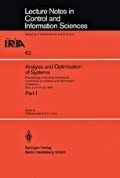Abstract
The Wigner-Ville spectrum is known to be the unique generalized spectrum for the time-varying spectral analysis of harmonizable processes. This time-frequency representation of a process is based on the covariance function and, for quasi-stationary processes, estimators can be defined by means of local time-averaging. We propose here a general class of such estimators relying on an arbitrary weighting function and discuss their first and second order properties in an unifying way. When specifying the arbitrary function, conventional estimators such as short-time periodograms and pseudo-Wigner estimators are recovered and can be compared. This generalized framework emphasizes the versatility of smoothed pseudo-Wigner estimators, especially for uncoupled time and frequency behaviors : they overcome the uncertainty relations of short-time periodograms which only can improve the performances in one direction of the time-frequency plane at the expense of a loss in the other one.
Preview
Unable to display preview. Download preview PDF.
5. References
Martin W.: "Time-frequency analysis of random signals", Proc. ICASSP, 1329–1332, Paris, 1982.
Flandrin P., Martin W.: "Sur les conditions physiques assurant l'unicité de la représentation de Wigner-Ville comme représentation temps-fréquence", 9ème Colloque GRETSI, Nice, 1983.
Martin W., Flandrin P.: "Analysis of non-stationary processes: short-time periodograms versus a pseudo-Wigner estimator", in Schüssler H. (Ed.), EUSIPCO-83, North Holland, Amsterdam, 1983.
Escudié B., Gréa J.: "Sur une formulation générale dans l'analyse en temps et fréquence des signaux d'énergie finie", Comptes Rendus, A, 283, 1049–1051, 1976.
Claasen T.A.C.M., Mecklenbräuker W.F.G.: "The Wigner distribution — a tool time-frequency signal analysis", Philips J. Res., 35, 217–250, 276–300, 372–389, 1980.
Flandrin P., Escudié B.: "Time and frequency representation of finite energy signals: a physical property as a result of an hilbertian condition", Signal Proc., 2, 93–100, 1980.
Allen J.B., Rabiner L.R.: "A unified approach to short-time Fourier analysis and synthesis", Proc. IEEE, 65, 1558–1564, 1977.
Flandrin P., Martin W.: "Pseudo-Wigner estimators for the analysis of non-stationary processes", Proc. ASSP Spectrum Estimation Workshop II, 181–185, Tampa, 1983.
Author information
Authors and Affiliations
Editor information
Rights and permissions
Copyright information
© 1984 Springer-Verlag
About this paper
Cite this paper
Flandrin, P., Martin, W. (1984). A general class of estimators for the wigner-ville spectrum of non-stationary processes. In: Bensoussan, A., Lions, J.L. (eds) Analysis and Optimization of Systems. Lecture Notes in Control and Information Sciences, vol 62. Springer, Berlin, Heidelberg. https://doi.org/10.1007/BFb0004941
Download citation
DOI: https://doi.org/10.1007/BFb0004941
Published:
Publisher Name: Springer, Berlin, Heidelberg
Print ISBN: 978-3-540-13551-7
Online ISBN: 978-3-540-39007-7
eBook Packages: Springer Book Archive

